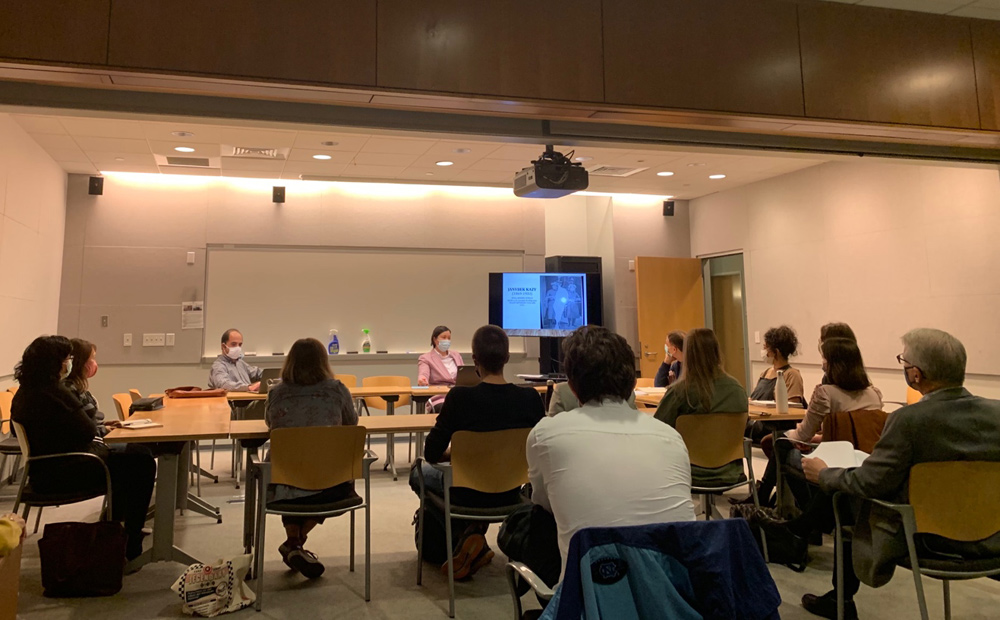On Thursday night once a month, the Carolina Russia Seminar is one of the highlights of the calendar for the UNC History Department. Started by Drs. Donald J. Raleigh and Louise McReynolds, its leadership was handed to Eren Tasar in 2017. Dr. Tasar had long understood the value of seminars for his own intellectual development: “When I was in graduate school, my advisor ran a seminar, where Ph.D students usually presented.” Dr. Tasar stated that it is key for young scholars to follow the pulse of research: “It’s very important for our graduate students, especially those planning a dissertation, to learn about the cutting-edge scholarship in the field.” While understanding developments in scholarship is necessary for planning academic work, Dr. Tasar also argues for the importance of community building: “Carolina is a supportive place, and the seminar really is about creating a sense of community for people who study Russia and the former Soviet Union.” This is particularly important as it is often difficult for graduate students to get outside of their own subfields. The seminar creates a space through which UNC graduate students can talk to one another.

Though the presenter lineup strives to bring prominent historians in the field to campus, one of the seminar’s main aims is to help doctoral students in the department, as well as MA students in the Global Studies Program’s Russia concentration, develop professionally. Dr. Tasar stated, “It’s a nice place to workshop ideas which they will later bring on to conferences and try to publish in journals.” This desire is connected back to the seminar’s existence as a comfortable space where students can welcome critique from friendly faces. This sentiment was shared by Ph.D. candidate Alma Huselja, who presented her work titled “‘Citizens and Thieves: Aryanization in Wartime Varaždin, Croatia” in August. “Since I had recently submitted an adaptation of my master’s thesis to a journal and was waiting for the readers’ reports, the seminar was a good way to talk through my ideas and hear helpful critiques on where the paper could be made better.”
UNC History Ph.D candidates are not the only people who present at the event. In October, Dr. Stephen Riegg, an Assistant Professor of History at Texas A&M University and recipient of a Ph.D from our department in 2016, presented his work, a potential first chapter for a book looking at the Russian empire’s attempts to control movement in the Southern Caucuses. A longtime veteran of the seminar from his graduate student days, Riegg highlights its importance in his own growth as a professional historian. “As a graduate student at Carolina, I attended the seminar with great interest, not only to learn about other researchers’ work, but also to experience the intellectual vibrancy of a supportive environment from which all of us benefited.” Riegg appreciates the ongoing participation of the seminars’ founders, Drs. Raleigh and McReynolds. “Their expertise as much as their enthusiasm for scholarly discussion makes the Carolina Seminar Series the sought-after intellectual venue it is.”
The seminar is not only an intellectual event, a social event as well. The seminars, which are held in the conference room on the fourth floor of the FedEx Global Education Center, are always followed by pizza and drinks, ordered from Dr. McReynolds’ favorite pizzeria, Sal’s. Thanks to the mild North Carolina winters, participants are able to eat, converse and gossip in the building’s outdoor rock garden, even on winter nights. Between bites, students have the opportunity to share impressions about the presenter’s work and engage visiting scholars in conversation. Scholars from other institutions in the area, such as UNC Greensboro, NC State, and Duke, also participate, as do colleagues from the Departments of Economics, Political Science, and Slavic Languages and Literatures.
Dr. Tasar notes that running the seminar is not without its challenges. The doctoral program in history at Carolina has long held pride of place in training historians at the cutting edge of scholarship on the Soviet Union and the Russian Empire. It has been a top destination for prospective Russianists for decades. The retirement of the two Russianists who built Carolina’s program in Russian history has created a gap that can only be filled when the History Department hires at least one Russianist. Currently, the graduate program in Russian history is primarily maintained by scholars focusing on Russia’s peripheries: Tasar is an expert on Soviet Central Asia, while Dr. Chad Bryant’s research focuses on modern Eastern Europe. Attendance at the seminar is also impacted by broader changes affecting graduate education in the humanities at UNC, as the department has reduced the cohort of incoming graduate students for several years in a row due to financial constraints.
Nevertheless, thanks to support from the History Department and the Carolina Seminars Program, the seminar has maintained a devoted following. The sense of community and solidarity fostered by participants makes the Russia Seminar a cornerstone of the intellectual life of our graduate program.
-Mark Thomas-Patterson
